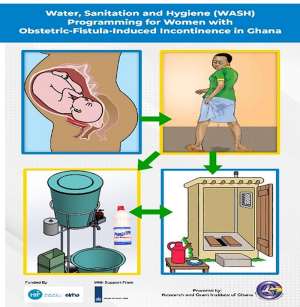
Managing incontinence, which is involuntary discharge of involuntary discharge of feces and/or urine through the vagina, has resulted in increased demand for water, sanitation, and hygiene (WASH) services for women with obstetric fistula.
Research revealed that 3 out of 10 women with obstetric fistula-induced incontinence reported difficulty accessing water, whereas 2 out of 10 expressed difficulty accessing toilet facilities. Access to sanitary products emerged as the most pressing issue. Out of every 10 women, almost 7 reported difficulty accessing sanitary products. About 9 out every 10 women reported that COVID did not improve their access to water, toilet facilities and hygiene services.
The research was conducted by the Research and Grant Institute of Ghana (ReGIG) and funded by the ELRHA-Humanitarian Innovation Fund. The research was led by Dr. Samuel Adjorlolo, the Executive Director of ReGIG and a senior Lecturer at the University of Ghana. The project partners were Fistula Foundation Ghana and CONIWAS. The findings were presented a stakeholder workshop held at the Fistula Unit of St Mercy’s Catholic Hospital, Mankessim, Central Region on March 02, 2021.
Data for the research was obtained from women with obstetric fistula using questionnaires, interviews and focus group discussion. In all, a total of 70 women participated in the study. The results showed that the women have used several materials to manage their incontinence. Some of materials are locally made by the women themselves. These include old clothes, diaper, sack cloth and gauze.
The women have devised means to reduce the impact of the incontinence by constipating themselves. They do so by changing their dietary habit such as eating food that has “constipating properties” such as bread before leaving the house. Other use drugs such as Imodium to suppress toileting.
Given these profound challenges, about 3 out of every 10 participants were not satisfied with how they manage their incontinence and thus are looking for better ways to manage their incontinence. The research fund that almost 6 out of every 10 participants reported that they are looking for better access to water. About 5 out of every 10 participants are looking for better access to toilet facilities. About 8 out of every 10 participants are looking for better access to sanitary products.
Additional findings relate to psychological, socioeconomic, and social experiences due to incontinence. Psychologically, the incontinence experience, particularly in public, leaves the women stigmatized, miserably shameful, embarrassed, confused, humiliated, isolated, sad/depressed, loss of self-confidence/low self-esteem. Almost 4 women out of 10 indicated that the incontinence has affected their emotional states negatively. Over 90% of the women agreed that they were sad all the time and 8 out every 10 women reported that they do not get good sleep.
Relating to socioeconomic experiences, the women reported career challenges, including inability to work and loss of job, family challenges such as marital issues and spousal neglect), poor social support, challenges associated with attending social functions (e.g, travelling anxiety) and self-social isolation.
According to Dr Adjorlolo, the findings are deeply troubling. He explained that limited access to WASH services could further worsen the poor mental health and suicidal thoughts by women with incontinence. This will also affect their inclusion in social, economic, and religious programs, culminating in unemployment/job loss, loss of livelihood.
The study revealed some measures to improve the WASH experiences of women with incontinence. These include the production and distribution of reusable sanitary pads/ diapers help women manage their incontinence, establishment/integration of incontinence-psychosocial support units into existing services to lessen the psychological burden on women with incontinence. The unit should also provide community support services such as linking women with incontinence to job opportunities and intervention programs introduced by governmental and non-governmental organizations, as well as supporting community reintegration of women with incontinence.
Others include facilitating the inclusion of women with fistula induced incontinence into the Livelihood Empowerment Against poverty (LEAP) program implemented by the Government of Ghana. The program, targeted at the vulnerable and aged should be extended to this unique population of women who live in abject poverty. Establishment of a National Fistula Fund to support women diagnosed with obstetric fistula condition to receive medical and surgical interventions to manage their incontinence. Lastly, public Education, awareness creation and advocacy should be intensified to reduce the psychological challenges experienced by women with incontinence, while increasing the sources of support in the family and community settings.




 Former Kotoko Player George Asare elected SRC President at PUG Law Faculty
Former Kotoko Player George Asare elected SRC President at PUG Law Faculty
 2024 elections: Consider ‘dumsor’ when casting your votes; NPP deserves less — P...
2024 elections: Consider ‘dumsor’ when casting your votes; NPP deserves less — P...
 You have no grounds to call Mahama incompetent; you’ve failed — Prof. Marfo blas...
You have no grounds to call Mahama incompetent; you’ve failed — Prof. Marfo blas...
 2024 elections: NPP creates better policies for people like us; we’ll vote for B...
2024 elections: NPP creates better policies for people like us; we’ll vote for B...
 Don’t exchange your life for wealth; a sparkle of fire can be your end — Gender ...
Don’t exchange your life for wealth; a sparkle of fire can be your end — Gender ...
 Ghana’s newly installed Poland train reportedly involved in accident while on a ...
Ghana’s newly installed Poland train reportedly involved in accident while on a ...
 Chieftaincy disputes: Government imposes 4pm to 7am curfew on Sampa township
Chieftaincy disputes: Government imposes 4pm to 7am curfew on Sampa township
 Franklin Cudjoe fumes at unaccountable wasteful executive living large at the ex...
Franklin Cudjoe fumes at unaccountable wasteful executive living large at the ex...
 I'll 'stoop too low' for votes; I'm never moved by your propaganda — Oquaye Jnr ...
I'll 'stoop too low' for votes; I'm never moved by your propaganda — Oquaye Jnr ...
 Kumasi Thermal Plant commissioning: I pray God opens the eyes of leaders who don...
Kumasi Thermal Plant commissioning: I pray God opens the eyes of leaders who don...
